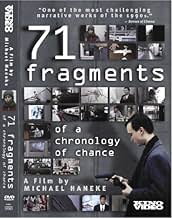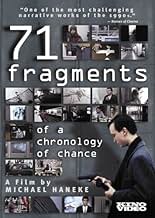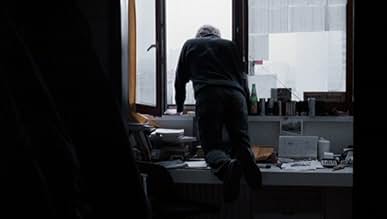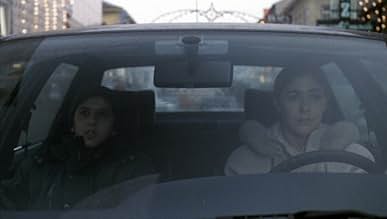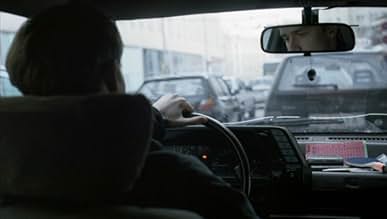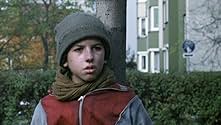71 Fragmentos de uma Cronologia do Acaso
Título original: 71 Fragmente einer Chronologie des Zufalls
AVALIAÇÃO DA IMDb
7,1/10
9,3 mil
SUA AVALIAÇÃO
Um conjunto de 71 cenas mostrando a vida de um imigrante, um casal que adotou uma filha, um estudante e um velho homem solitário.Um conjunto de 71 cenas mostrando a vida de um imigrante, um casal que adotou uma filha, um estudante e um velho homem solitário.Um conjunto de 71 cenas mostrando a vida de um imigrante, um casal que adotou uma filha, um estudante e um velho homem solitário.
- Prêmios
- 4 vitórias e 1 indicação no total
Michael Jackson
- Self
- (cenas de arquivo)
- (não creditado)
Avaliações em destaque
If you're looking for something happy, uplifting, and fun then steer clear of this movie. If you're looking for something easy and simple then steer clear of this movie. If you're looking for something that you can watch with half a brain then avoid this movie like the plague. 71 Fragments of a Chronology of Chance is an experimental film from visionary mastermind Michael Haneke. The film is 71 different scenes that highlight small tidbits of the lives a seemingly random collection of people. News clips of war and Michael Jackson are spliced into the film as well, creating a disjointed and difficult narrative that in some ways all ties together, but in other ways stays loose and frivolous. The interpretation of this kind of narrative style is at the viewers discretion.
If you're at all familiar with Haneke's work then you'll know not to expect anything straightforward going into this film. If you go into this film knowing nothing about Haneke then may God have mercy on your soul. Not really, just be prepared. This is not an easy film to follow being that there seems to not be much to follow. The majority of the film spends its time laying down the various puzzle pieces with very little rhyme or reason to the distribution of the pieces. Towards the end of the film the pieces begin coming together for a fairly anticlimactic ending that reflects the perpetual sadness of a world full of violence, hardship, neglect, and hatred. You'll never miss Haneke's macabre cynicism in any of this films, and especially not this one.
It's difficult for me to form a steadfast opinion on this film because it is so out there and so difficult to fully comprehend. As always, I respect Michael Haneke for the being the true genius he is. He's created something wholly original and intuitive here, I just can't quite place what it is. There are a lot of lines going in different directions here and they never seem quite seem to meet up. This film challenges the ideas of your typical film narrative and I have to give it kudos for taking such risks and ending up with something that works more or less. 71 Fragments of a Chronology of Chance isn't a film you just watch, it's something you experience.
If you're at all familiar with Haneke's work then you'll know not to expect anything straightforward going into this film. If you go into this film knowing nothing about Haneke then may God have mercy on your soul. Not really, just be prepared. This is not an easy film to follow being that there seems to not be much to follow. The majority of the film spends its time laying down the various puzzle pieces with very little rhyme or reason to the distribution of the pieces. Towards the end of the film the pieces begin coming together for a fairly anticlimactic ending that reflects the perpetual sadness of a world full of violence, hardship, neglect, and hatred. You'll never miss Haneke's macabre cynicism in any of this films, and especially not this one.
It's difficult for me to form a steadfast opinion on this film because it is so out there and so difficult to fully comprehend. As always, I respect Michael Haneke for the being the true genius he is. He's created something wholly original and intuitive here, I just can't quite place what it is. There are a lot of lines going in different directions here and they never seem quite seem to meet up. This film challenges the ideas of your typical film narrative and I have to give it kudos for taking such risks and ending up with something that works more or less. 71 Fragments of a Chronology of Chance isn't a film you just watch, it's something you experience.
I must say that I really enjoyed this movie. The subtle exploration of the character in very personal en realistic scenes were executed in the perfect cinematic way (framing, staging, blocking, pacing, editing). The way Haneke used (the lack
of) cohesive plot really caught my attention and made me excited about how the story was going to unfold. Though the end was a bit unsatisfying for me. I wasn't drawn enough to the characters to experience a emotional climax through any strong perspective from a character arc. I understanded the thematic exploration but found the climax a bit underwhelming. I'll defintely rewatch to get a hold of more missed details which might immerse me more than my first viewing.
As a massive Haneke fan, 71 Fragments and Time of the Wolf were the only films of his I had left to see. I ticked 71 Fragments off last night and was left feeling slightly underwhelmed. It isn't a bad film or anything, it's just very pedestrian for Michael. It lacks the emotional power of The Seventh Continent, the shock of Benny's Video and the technical skill of Code Unknown, yet it resembles all three. If those three films had a hideously depressing threesome, then 71 Fragments would probably be its mediocre child.
Thankfully it's not as horrifyingly boring as The Castle or the second half of Benny's Video, even though the plot description sounds like it could be. It follows about four unrelated characters going about their everyday business. There's a ping ponging student, a stowaway boy, a depressed couple and a lonely Granddad. Haneke gives us very brief snapshots of their lives which is reminiscent of Code Unknown and Happy End, although not as focused or engaging. I didn't find any of it boring, just a little bit repetitive. The ending also isn't as shocking as it would like to think it is.
So in the end, it's a well-made little film which some interesting themes and the odd great scene, however it's not worth going out of your way to find. To my mind, Haneke's greatest films are: Amour, The Piano Teacher and Hidden.
Thankfully it's not as horrifyingly boring as The Castle or the second half of Benny's Video, even though the plot description sounds like it could be. It follows about four unrelated characters going about their everyday business. There's a ping ponging student, a stowaway boy, a depressed couple and a lonely Granddad. Haneke gives us very brief snapshots of their lives which is reminiscent of Code Unknown and Happy End, although not as focused or engaging. I didn't find any of it boring, just a little bit repetitive. The ending also isn't as shocking as it would like to think it is.
So in the end, it's a well-made little film which some interesting themes and the odd great scene, however it's not worth going out of your way to find. To my mind, Haneke's greatest films are: Amour, The Piano Teacher and Hidden.
Mr. Michael Haneke begs the audience to start asking the important questions.
The film begins with a text of a news item involving a bank shooting incident in Vienna a day before Christmas eve 1993 that left three people dead with the 19-year-old assailant later found to have shot himself nearby.
What then follows is a series news broadcasts interspersed with scenes involving seemingly random characters while they go through their day-to-day existence: a Romanian refugee who illegally entered Austria seeking asylum, a soldier, an armored van security guard, a college student, a couple having trying to adopt a kid, and elderly man and his bank employee daughter.
The film is, as the title indicates (and I'll take the filmmaker's word on that), there are a total of "71 fragments" divided into segments that are separated by almost three seconds of black frames. I actually took trouble counting those (because I don't have a life) and found out that--
The different characters are shown going through mundane activities throughout the film and it gives the viewers an insight to human behaviour and the dynamic between the characters whose connection to the other charcters are more evident than some. They are also seen to be watching these same news broadcasts in their respective environments apart from the segments that solely featured these news items being played on-screen, which in a way connects almost every person in this film.
Mr. Haneke has a style all to his own. He's a master in evoking fright without necessarily having to show much, this will be apparent near the end of the film, the Haneke genius I'd say, just as gruesome. This is not one of his best work but it stands out on its own for the always-relevant commentary that he wishes to expound.
The narrative that Mr. Haneke wanted to express could only be realized through a closer scrutiny of the various fragments which eventually points to a far greater tragedy, and he also throws in a fair warning as well. The same thing could also can be said regarding the conflicts around the world. We see the news on TV, the horrific images, the drama, yet something is lacking. What were the events that led up to the tragic outcome that we all get to witness on the screen? Clearly, there are some people who know more than others and the news reporters seem not to be able to get to those people for some reason or another, it is this incompleteness that kind of detaches us, the viewers, from the horror, and there are people taking advantage of other people's silence and rendering them just as complicit to those acts of violence.
My rating: A-minus.
The film begins with a text of a news item involving a bank shooting incident in Vienna a day before Christmas eve 1993 that left three people dead with the 19-year-old assailant later found to have shot himself nearby.
What then follows is a series news broadcasts interspersed with scenes involving seemingly random characters while they go through their day-to-day existence: a Romanian refugee who illegally entered Austria seeking asylum, a soldier, an armored van security guard, a college student, a couple having trying to adopt a kid, and elderly man and his bank employee daughter.
The film is, as the title indicates (and I'll take the filmmaker's word on that), there are a total of "71 fragments" divided into segments that are separated by almost three seconds of black frames. I actually took trouble counting those (because I don't have a life) and found out that--
The different characters are shown going through mundane activities throughout the film and it gives the viewers an insight to human behaviour and the dynamic between the characters whose connection to the other charcters are more evident than some. They are also seen to be watching these same news broadcasts in their respective environments apart from the segments that solely featured these news items being played on-screen, which in a way connects almost every person in this film.
Mr. Haneke has a style all to his own. He's a master in evoking fright without necessarily having to show much, this will be apparent near the end of the film, the Haneke genius I'd say, just as gruesome. This is not one of his best work but it stands out on its own for the always-relevant commentary that he wishes to expound.
The narrative that Mr. Haneke wanted to express could only be realized through a closer scrutiny of the various fragments which eventually points to a far greater tragedy, and he also throws in a fair warning as well. The same thing could also can be said regarding the conflicts around the world. We see the news on TV, the horrific images, the drama, yet something is lacking. What were the events that led up to the tragic outcome that we all get to witness on the screen? Clearly, there are some people who know more than others and the news reporters seem not to be able to get to those people for some reason or another, it is this incompleteness that kind of detaches us, the viewers, from the horror, and there are people taking advantage of other people's silence and rendering them just as complicit to those acts of violence.
My rating: A-minus.
An excellent movie that took my breath away. Haneke forces us to view television like we view film. He has no answers but throws us many questions. One of many things this movie shows us is how we stop to listen to the violence the news presents for us every day. We has almost come to the point that we need the films storytelling to get involved, but even then do we act?
Você sabia?
- CuriosidadesFilm debut of Sebastian Stan.
- Erros de gravaçãoWhen Tomek (Otto Grünmandl) makes himself dinner, around the 20 minutes mark, there's a mirror in the background that reflects the boom mic.
- ConexõesFeatured in Mein Leben: Michael Haneke (2009)
Principais escolhas
Faça login para avaliar e ver a lista de recomendações personalizadas
- How long is 71 Fragments of a Chronology of Chance?Fornecido pela Alexa
Detalhes
- Data de lançamento
- Países de origem
- Idiomas
- Também conhecido como
- 71 Fragments of a Chronology of Chance
- Locações de filme
- Empresas de produção
- Consulte mais créditos da empresa na IMDbPro
- Tempo de duração1 hora 40 minutos
- Cor
- Proporção
- 1.66 : 1
Contribua para esta página
Sugerir uma alteração ou adicionar conteúdo ausente

Principal brecha
By what name was 71 Fragmentos de uma Cronologia do Acaso (1994) officially released in India in English?
Responda
